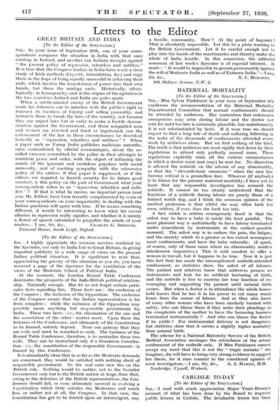Letters to the Editor
GREAT BRITAIN AND INDIA
[To the Editor of the SPECTATOR.] Sm,—In your issue of September 20th, one of your corre- spondents compares the situation in India with that once existing in Ireland, and another (an Indian) inveighs against " the present policy of repression, relentless and ruthless." It is true that the Congress leaders in India have made a close study of Irish methods (boycott, intimidation, &c.) and copy them in the hope of being equally successful in achieving their ends, which involve the transference of power into their own hands, but there the analogy ends. Historically, ethno- logically, in homogeneity, and in the origins of the agitation in the two countries Ireland and India are poles apart.
When a subtle-minded enemy of the British Government sends his followers cut to interfere with the public's right to transact its business of buying and selling peaceably, and instructs them to break the laws of the country, not because they are unjust laws but in order to make a hostile demon- stration against the Government, and those misguided men and wcmcn are arrested and fined or imprisoned, can the enforcement of the law in these circumstances be described honestly as " repression, relentless and ruthless " ? When a paper such as Young India publishes malicious untruths, since contradicted by official communiqués, about the so- called excesses committed by the police in their attempts to maintain peace and order, with the object of inflaming the minds of the ignorant and credulous populace with racial animosity, and of exciting sympathy with the subversive policy of the editors, if that paper is suppressed, or if the editors are required to furnish security for its future good conduct, is this policy on the part of Government what your correspondent refers to as " repression, relentless and ruth- less " If that is what he means, no impartial person (and you, Mr. Editor, have been recently complimented by seine of your correspondents on your impartiality in dealing with the Indian question) will agree with him. If he means something different, it would be interesting to know what his covert allusion to repression really signifies, and whether it is merely a flower of speech calculated to prejudice the minds of your


































 Previous page
Previous page